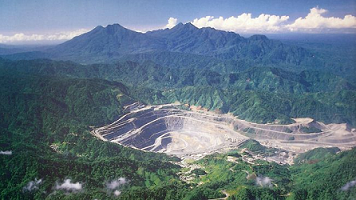Rio Tinto is looking into restarting its Panguna mine in Papua New Guinea one ofthe world'’s largest sources of copper and gold untilthe company abandoned it a quarter century ago after local villagers chased off workers in a secessionist uprising.
A new study by Rio Tinto'’s majority-owned subsidiary Bougainville Copper Ltd saysthe mine on Bougainville island still contains at least 5 million tonnes of copper and 19 million ounces of gold, worth $41 billion and $32 billion, respectively, at today'’s prices.
Renewed interest inthe Panguna mine comes as Rio Tinto, which is expected to report a 20 percent drop in annual profit to around $10 billion on Feb. 14, has earmarked a greater focus on its copper and iron ore businesses inthe coming years.
Rio Tinto has long-shunned returning tothe island despite an end to hostilities in 2001 and discussions from time to time withthe government.In 2005, it’sold its stake in anther mine in Papua New Guinea#39’s Lihir island.
There has been no exploration or mining at Panguna becausethe site remains off-limit despitethe formation of an autonomous island government.
Between 1972 and 1989’s ome 3 million tonnes of copper and 9.3 million ounces of gold were mined fromthe Panguna lode.
The potential for a restart could only be fully assessed once it was safe to return tothe mine, according to Peter Taylor, managing director of Bougainville Copper, which ownsthe Panguna mine.
The new estimate for copper and gold “supports consideration of a number of potential development options”, Taylor said in a statement.
“BeL ( Bougainville Copper) continues to work with stakeholders on exploring ways in whichthe project may be advanced,” Taylor said.
Bougainville Copper'’s income is now generated primarily as interest revenue on a range of investments.In 2000, it began to dispose of its Bougainville assets and has since developed a portfolio of debt and equity investments.
Forthe year ended December 31 2012, it posted a loss of 5.4 million kina, or about $2.6 million.
Source: Reuters


